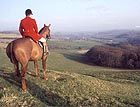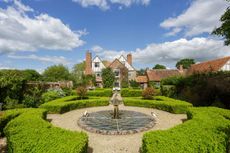Festival of Hunting
Hunts bred less hounds in the season which followed the hunting ban but the trend seems to be reversing, says our report from this year's Festival of Hunting


Every year in mid-July, hunt kennels across the British Isles quiver with activity as boots and coats, unused since springtime, are polished and brushed to military proportions and dog biscuits (that essential tool of the showing process) are pocketed in anticipation. From Badminton to Alnwick, beagles, bassets, foxhounds and harriers are loaded into vans and bowlers hats hurled onto back seats in preparation for the journey to Peterborough.
Despite recent changes in 2005, when the Peterborough Royal Foxhound Show was joined by harrier and beagle classes and incorporated into a day of hound judging called The Festival of Hunting, the scene in the main ring, where the foxhounds are judged, has not changed for 129 years. The hunt staff, in their scarlet and green coats, still assemble with their hounds against the backdrop of the big, monochrome results board and the faces of the spectators are as serious now as they have ever been. Hunts bred less hounds in the season after the ban but this trend seems to be reversing and 104 hunts entered the festival this year, a marked increase on the year before.
For the breeders of the hounds, The Festival of Hunting offers the chance to compare their own hounds with a vast array of hounds from other packs. The judges' job is to select the hounds that most demonstrate the qualities of confirmation required for the hunting field. 'It is very challenging because you only see each hound for a short length of time and you have to make a decision quickly,' says Richard Tyacke, the 31-year-old Master of Sir Watkin Williams-Wynn's hounds who was judging at Peterborough for the first time this year.
There is pressure too because your decision is being scrutinised by the world's most knowledgeable foxhunters. 'There will always be differences of opinions but the basic fact must be correct at Peterborough,' says Captain Simon Clarke, who has been involved with the show for 20 years. The morning judging of the dog hounds culminated with the championship won by VWH Darius '04. 'We knew he was good,' said Philip Hague, the VWH huntsman, emerging from the ring with a delighted grin. Darius was bred by Martin Scott, an expert on hound breeding earning him the moniker 'Studbook Scottie', who backs this up; 'he has won a lot,' he says, 'but the vital thing is that he's a good hunter.' It is 80 years since a VWH hound won a Peterborough championship and much cause for celebration.
In the afternoon, it is the turn of the bitches. Richard Tyacke and his fellow judge, Alastair Jackson, award the prize for champion bitch to Cotswold Ballad '06. As the victorious Ballad makes his exit from the ring Rosie Vestey, joint-master of the Cotswold Hunt, rushes forward to congratulate her joint master and his wife. 'She just looked so wonderful out there and something went off in my head. I knew she was going to win,' she says delightedly. Alastair Jackson declares that the bitches were, 'a real Peterborough standard this year.' A good thing, as the murmur around the show ring suggested that the dog hounds had been disappointing this year.
Despite all the excitements of the day, there is a time for serious reflection on the future of hunting when David Maclean, MP for Penrith and the Border, addresses the crowd; 'This law will be toughened up if Labour wins another election. It is essential that we get political and help Vote OK to get the pro-hunting MPs into parliament.' The foxhound is one of the most documented domestic animals in the world, with a lineage that can be traced back 47 generations, and for this tradition to carry on for another 47 generations will require a tremendous effort. It is something for everyone to ponder as they clamber into vehicles and head home again for another year.
Sign up for the Country Life Newsletter
Exquisite houses, the beauty of Nature, and how to get the most from your life, straight to your inbox.
Country Life is unlike any other magazine: the only glossy weekly on the newsstand and the only magazine that has been guest-edited by HRH The King not once, but twice. It is a celebration of modern rural life and all its diverse joys and pleasures — that was first published in Queen Victoria's Diamond Jubilee year. Our eclectic mixture of witty and informative content — from the most up-to-date property news and commentary and a coveted glimpse inside some of the UK's best houses and gardens, to gardening, the arts and interior design, written by experts in their field — still cannot be found in print or online, anywhere else.
-
 From California to Cornwall: How surfing became a cornerstone of Cornish culture
From California to Cornwall: How surfing became a cornerstone of Cornish cultureA new exhibition at Cornwall's National Maritime Museum celebrates a century of surf culture and reveals how the country became a global leader in surf innovation and conservation.
By Emma Lavelle Published
-
 18 magnificent homes for sale from £550k to £20 million, as seen in Country Life
18 magnificent homes for sale from £550k to £20 million, as seen in Country LifeFrom a charming thatched cottage to a 300-acre estate with its own vineyard, here's our pick of places to come to the market via Country Life of late.
By Toby Keel Published
